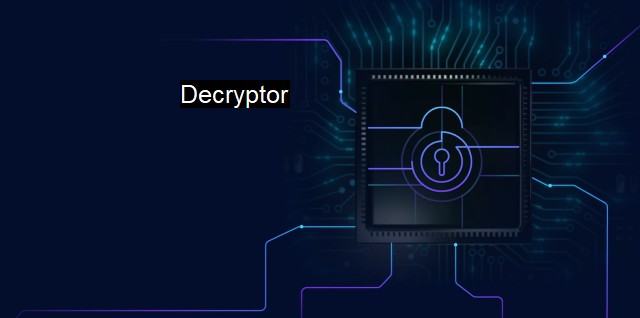What is Decryptor?
Countering Malware Threats: The Importance of Decryptors in Cybersecurity and Ransomware Response
Encryption technologies are an essential aspect of modern information processing systems. They are prominent providing protection against unauthorized access, tampering, and data breaches. Consequently, an understanding of decompression or decryption technology, typically referenced as "Decryptor”, is critical in comprehending data security and antivirus mechanisms.A decryptor, or decryption tool, is a vital component of encryption technology. Broadly, it is a software program designed to decrypt or convert encrypted data back into its original, readable format. This process is possible by applying the appropriate decryption key that corresponds to the specific encryption used on the data.
In different software programs, including antivirus options, a decryptor is utilized to render important data secure during transfer across networks or storage in databases. When users receive data that has been encrypted, a decryptor is used to rebuild the information into a usable format. Without a decryptor, the data remains in an unreadable mixed format, making it useless.
ETFs have started using advanced encryption algorithms in modern computer security applications, thereby making decryption harder. Advanced standard protections such as the Advanced Encryption Standard (AES) generally involve complex mathematics to ensure tampering with data is not easily possible, allowing for more secure systems.
In the context of cybersecurity and antivirus software, a decryptor possesses significant importance. Viruses often encrypt your data to hold it hostage, a tactic used in ransomware attacks. Ransomware is a type of malicious program that blocks access to a user's computer system until a certain amount of money is paid. Recently, the use of ransomware attacks has spiked on both private users and enterprises. Usually, during a ransomware attack, malware encrypts the victim's files, making them inaccessible. The attacker then demands a ransom in return for the decryptor to convert the encrypted files back to their initial state.
In facing such situations, antivirus software comes equipped with various decryptors to treat different types of ransomware. They operate by identifying the specific encryption algorithm that a piece of ransomware has used and then applying the corresponding decryptor to recover the files. Consequently, the decryptor plays an essential role in cybersecurity as it allows the victims of ransomware attacks to regain access to their encrypted files without agreement or payment to their malicious perpetrators.
Decryptors are instrumental in digital forensics and counter cyber-espionage. Digital forensics, the process of uncovering and interpreting electronic data, uses decryptors to access hidden, locked, or encrypted data by cybercriminals. Investigators can unravel different encryption types using an appropriate decryptor, which helps them delve into criminal activities that have a virtual footprint. On a similar note, decryptors aid counter-espionage efforts, providing the means to expose the hidden information, data leakage, and other malicious content that could compromise a system's integrity.
Not all decryption is ethical. Unauthorized decryption is a form of cybercrime and is typically used for illicit activities such as data breaches, identity theft, unauthorized system access, and more. It underscores the importance of control measures in the dissemination and use of decryptors and related information.
The decryptor is crucial in modern cyber practices. It doubles as both a tool for data security during regular transmission and as a weapon against cybersecurity threats such as ransomware. Simultaneously, the possessive potential and threat attached to unauthorized decryption predicts the need for responsible and ethical cybersecurity practices and policies in the future.

Decryptor FAQs
What is a decryptor?
A decryptor is a type of software tool that is designed to reverse encryption or decryption operations. In the context of cybersecurity and antivirus, a decryptor is often used to recover files that have been encrypted by malware or ransomware.How does a decryptor work?
A decryptor works by using a decryption key, which is typically generated by the attacker or malware author, to reverse the encryption process and restore the original file. In some cases, a decryptor may use other methods, such as brute force attacks or analysis of the malware code, to recover the decryption key.When should I use a decryptor?
You should use a decryptor if your files have been encrypted by malware or ransomware and you do not have a backup of the original files. It is important to note that not all types of encryption can be reversed by a decryptor, and even if a decryptor is available, there is no guarantee that it will be effective.Where can I find a decryptor?
Decryptors are typically provided by cybersecurity companies or law enforcement agencies that have analyzed the malware and identified a way to recover the encrypted files. You can search for decryptors online, but it is important to be cautious and only download tools from reputable sources to avoid downloading malware or other malicious software.| | A | | | B | | | C | | | D | | | E | | | F | | | G | | | H | | | I | | | J | | | K | | | L | | | M | |
| | N | | | O | | | P | | | Q | | | R | | | S | | | T | | | U | | | V | | | W | | | X | | | Y | | | Z | |
| | 1 | | | 2 | | | 3 | | | 4 | | | 7 | | | 8 | | |||||||